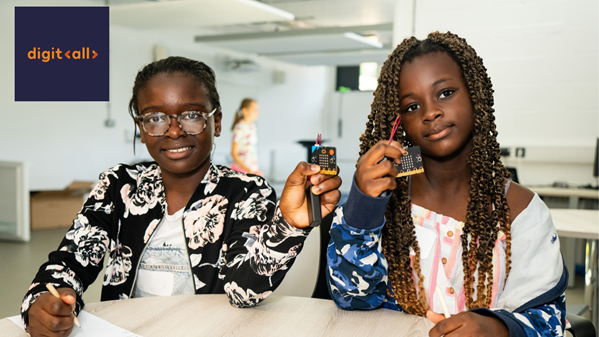- Ages 9 to 11
- In-school
- 1 to 2 hours
- Free Bursaries available
Workshop
EcoCode - Cosmic rays with the micro:bit
Code a cosmic ray detector to help children understand the importance of cosmic rays in space and its link to sustainability

Workshop
Code a cosmic ray detector to help children understand the importance of cosmic rays in space and its link to sustainability

Meet young people where they are at with a focus on climate action. In this cosmic ray EcoCode workshop, students find out more about cosmic rays from space, why they are fascinating and how they can impact data we collect about the environment.
Using programming concepts such as sequence, selection and iteration, students work in pairs to prototype a solution to identify cosmic rays. They achieve this through using radio transmission between two micro:bits and the use of laser pens.
They identify how careers in Computing and Engineering can lead to using technology for good and saving lives of other young people in developing countries.
During this workshop, the pupils work in small teams and develop their problem-solving skills through pair programming and collaborative communication.
Workshops are available for KS2 and are suitable for Year 4, 5 and 6 pupils.
Key information
Improve engagement, interest or enjoyment in STEM subjects
Improve attainment and progress in STEM subjects
Learning what the engineering workplace is like
Develop engineering employability skills
Improve awareness and aspirations for STEM-related study and careers
Challenge stereotypes by showing the diversity of disciplines, people and skills involved in engineering
Whichever curriculum your school follows, pupils should have the opportunity to carry out practical investigations in science that help them to develop their scientific skills. This experience builds the following enquiry skills:
The essential skills every young person needs to succeed in education and their future career. Find out more at the Skills Builder Partnership. This experience builds the following skills:
Problem solving - Finding solutions to challenges
Teamwork - Working cooperatively with others to achieve a shared goal
What the teachers sayLog in to write a testimonialWe would love to read all about your time with this experience!

Hands-on learning about sustainable electricity generation through solar and wind.

Code an early warning system to help children understand the importance of mitigating the effects of natural hazards with the micro:bit.